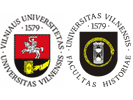The article deals with the newest historiography on the analyses of Vilnius history through the use of multi-perspective methodology (Multiperspectivität).
The history of Vilnius (14th-16th c.) due to its multiethnic, multicultural and multiconfessional aspects suits this methodological reflection since it does not seek to find ,,objective" monoview or to equalise relief of historical identities but in contrary to discover concepts and subjects which can reveal the variety of historical consciousness or even help in their formation.
Theses - capital of Lithuania Vilnius is multiethnic and multicultural city is banal and does not need to be proved. Although there is no such an insight in the nowadays historiography. On the one hand, the status of Vilnius as a capital was argued because of its multiethnicity, on the other hand the question of multiculture was often neglected by stressing Polish, Russian or Byelorussian heritage and so participating in the political partition of Vilnius.
The main tendencies of the different development of historical perspectives. Nowadays changes in the model of cultural history of Lithuania could be found: from baltophilical (S. Daukantas) and lithuanocentric (A. Sapoka) concepts towards concept of Lithuania's europeasation formulated by E. Gudavicius and research of J.Bardach signifying the independence Lithuania at the end of the 18th century
We also could discuss new preconditions for the perspectives of historical consciousness of Lithuanian Poles (for example: introduction of the polish-speaking nobility into the 19th century Lithuanian society, theory of europezation). These premises allow us to form insight on the perspective of Lithuanian Poles’ historical consciousness.
The reality of Lithuanian Russians, Ukrainians historical consciousness form an insight that correct scientific historiographical bases has to be developed for the research on identities of the ethnical groups mentioned above.
The phenomenon of Vilnius Jews community brings Lithuanian capital into another higher trajectory of historical consciousness. Vilnius could be called ,,Northern Jerusalem" not only because of its phenomenal role played in Jewish culture but also because it is very difficult to find so many nations and confessions living so close to each other as here at the end of the 20th century. In this context Lithuanian capital appears as a sphere of gravitation and junction of several civilizations and also as the coexistence space of several confessions. | 

 dizainas ir programavimas giriaus
dizainas ir programavimas giriaus  dizainas ir programavimas giriaus
dizainas ir programavimas giriaus